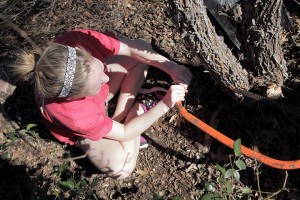
Travis Taylor | Lariat Photo Editor
By Lauren Tidmore
Reporter
A recording of Martin Luther King’s “I Have a Dream” speech resonated throughout Jubilee Theatre as nearly 180 Mission Waco volunteers waited to begin a day of honor and service Monday morning.
The morning was to begin with the theatrical presentation of Gloria Bond Clunie’s “North Star,” which will continue to run at 7:30 p.m. Jan. 24-Jan. 26 in the Jubilee Theatre, as well as two matinees at 3:00 p.m. Jan. 25 and 26. To purchase tickets, visit the Mission Waco front office or www.jubileetheatre-waco.org.
Members of Seventh & James Baptist Church, St. Louis Catholic Church’s youth group, McLennan Community College presidential scholars, representatives from Starbucks and H-E-B’s diversity council and Waco volunteers listened as Pastor Jimmy Dorrell, co-founder and executive director of Mission Waco, told of his first-hand experiences with racial segregation.
“I was a kid of the ‘60s,” Dorrell said. “I grew up in East Texas, which was a divided community.”
Dorrell told of a specific, life-shaping incident in 1967 that occurred in his East Texas church. He remembered church deacons standing guard in front of the building’s entrances to keep a queue of African-Americans from participating in the services. Nowadays, Dorrell strives for equality and racial reconciliation through his work at Mission Waco.
“Our goal is to fight the systemic injustice of dividing people by class and race,” he said.
After a quick audience response-based civil rights history quiz and a collective prayer, theater house lights dimmed and voices hushed to watch the opening scene of director Khira Hailey’s presentation of the civil rights play, “North Star.” The play, set in a 1960s North Carolina is the story of a young African-American girl, Relia, and her fight for and family tensions concerning “Big Freedom” demonstrations.
“It’s a great show that opens doors for conversation about racism and segregation,” Hailey said.
Audience members laughed throughout the presentation, but for one in particular, it took her back to a time she knew all too well.
Seventy-four-year-old Janith Jenson-Elbert, a 1965 Baylor graduate, grew up in a segregated Waco in which black and white people couldn’t share the same water fountains, let alone attend the same colleges. Before her final semester at Baylor, she applied and was accepted for attendance at Huston Tillotson University in Austin, which had a strictly black student body. While juggling raising three children, Jenson-Elbert drove the 102 miles to Austin each week to attend her one biology class.
“I was the only white person in the room,” she said. “I was sitting in a desk, and someone came up behind me and said, ‘That’s my seat.’ I told them I was sorry and said I would bring my own chair next time.”
It wasn’t until her fellow classmates began to realize she was who she claimed to be that they began to accept her. After being denied a book at the beginning of the semester, another student gave up her book to help Jenson-Elbert in her studies.
Jenson-Elbert said she was too innocent at the time of her attendance at Huston Tillotson. For that reason, she spends much of her time attending events and discussions that will make her better informed on the issue of racial segregation in the past and today.
“I had to stop and be a mender. I have no excuse for not doing stuff now,” she said.
During the youth lunch and discussion following “North Star,” Mission Waco Youth Center volunteer Elijah Muhammed asked the audience if they believed racism was still in existence.
A mixture of yes’s” and “no’s spread amongst the youth in attendance. Others said racism is still prevalent but in smaller amounts.
“The problem is with the church,” said Kent McKeever, Seventh & James Baptist Church’s youth minister and Mission Waco volunteer. “The more segregation, the more racism.”
A general consensus about this issue was made evident through the comments made by two other Mission Waco leaders as well.
“The church is still behind as a multicultural institution,” Dorrell said
Travis Taylor | Lariat Photo Editor
“Even MLK said, ‘We are never more segregated as we are on Sunday morning,’” said Trent Futral, Mission Waco Youth Center Director and “North Star” actor.
Futral said the main theme of the play is heard through the lines of the character representing the future personification of Relia. Multiple times the “older Relia” said she could no longer find the North Star in today’s time.
The assembly of 180 plus volunteers continued to the service portion of the day’s events to honor the nation-changing work done by Dr. Martin Luther King, Jr. The volunteers divided into various groups that worked at 12 different Waco locations in need.
As seen during the play and afterward at the various work sites, Mission Waco plans to continue to strive for its goal of racial reconciliation by creating a multicultural community of fellowship and service in which Wacoans of all different races and classes work together for the common good. This approach to mending the past might be best explained through the words of Relia’s grandmother in “North Star.”
“The only way to beat death is to die. The only way to beat fear is to be afraid. Once you taste it, you can chew it. But you can learn how to spit it out.”






